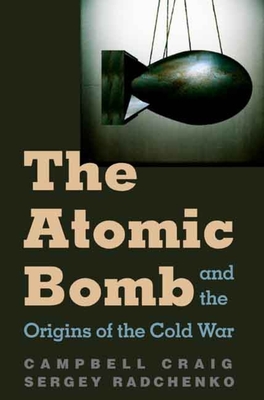

 Yale University Press
Yale University Press
The Atomic Bomb and the Origins of the Cold War


Key Metrics
- Campbell Craig
- Yale University Press
- Hardcover
- 9780300110289
- 9.49 X 6.31 X 0.86 inches
- 1.02 pounds
- History > Modern - 20th Century
- English
 Secure Transaction
Secure TransactionBook Description
An original study of the atomic bomb's key role in triggering the post-World War II confrontation between the US and the USSR
After a devastating world war, culminating in the obliteration of Hiroshima and Nagasaki, it was clear that the United States and the Soviet Union had to establish a cooperative order if the planet was to escape an atomic World War III.
In this provocative study, Campbell Craig and Sergey Radchenko show how the atomic bomb pushed the United States and the Soviet Union not toward cooperation but toward deep bipolar confrontation. Joseph Stalin, sure that the Americans meant to deploy their new weapon against Russia and defeat socialism, would stop at nothing to build his own bomb. Harry Truman, initially willing to consider cooperation, discovered that its pursuit would mean political suicide, especially when news of Soviet atomic spies reached the public. Both superpowers, moreover, discerned a new reality of the atomic age: now, cooperation must be total. The dangers posed by the bomb meant that intermediate measures of international cooperation would protect no one. Yet no two nations in history were less prepared to pursue total cooperation than were the United States and the Soviet Union. The logic of the bomb pointed them toward immediate Cold War.
Author Bio
I'm an historian and theorist of modern international politics, with particular interests in the nuclear revolution, US foreign policy, and the Cold War. On these topics I have written several books and many articles, reviews, and essays.
I have just completed work on Marxism and the nuclear revolution, in the form of an article on nuclear weapons and current Marxist theory in the European Journal of International Relations and, with my Cardiff colleague Sergey Radchenko, an article in the Journal of Strategic Studies on Khrushchev's encounter with nuclear weapons and what this says about contemporary attempts to revive nuclear strategy.
My colleague Jan Ruzicka and I are working on our book on US preponderance and the nuclear nonproliferation regime, which will be published by Cornell University Press's series in Security Affairs.
I've been a professor here at Cardiff since February 2016. Before that I was professor at Aberystwyth University (2009-16) and at Southampton University (2005-09).
I have held senior visiting fellowships at Yale University (2004-05), the Norwegian Nobel Institute (2009), the European University Institute (2013), and Bristol University (2015).
Education
BA Carleton College (1986), MA University of Chicago (1988), PhD Ohio (1995)
Videos






Community reviews
Write a ReviewNo Community reviews